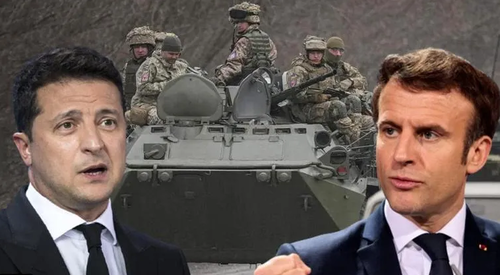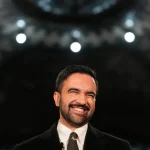
French President Emmanuel Macron has warned that the West must not humiliate Russia if it wants to avoid an unnecessarily prolonged conflict that could spread beyond Ukraine. Since making the remarks days ago, he's stirred anger among different allies - both in Europe and the US and UK.
And he's again come under fresh criticism and condemnation for the statement. He said last Friday, "We must not humiliate Russia so that the day when the fighting stops we can build an exit ramp through diplomatic means." As part of the comments he offered France's role as a "mediating power" in the conflict. This after having reportedly held calls with Russian President Vladimir Putin on pretty much a weekly basis since the invasion began in late February.

Macron has come under criticism from some corners of the EU for even holding the calls where he's attempted to gain diplomatic concessions, and jump start talks again between Moscow and Kiev. But he hasn't exactly been alone in his push for a diplomatic solution, given two other populous European nations and their leaders - namely German Chancellor Olaf Scholz and Italian Prime Minister Mario Draghi - have done the same.
Entirely to be expected, Macron immediately received pushback from the Ukrainians, with Foreign Minister Dmytro Kuleba writing on Twitter that "Calls to avoid humiliation of Russia can only humiliate France and every other country that would call for it."
But the Macron comments have stirred anger in the US as well, with Republican hawk Rep. Adam Kinzinger saying "Emmanuel Macron is humiliating himself," in weekend statements. "Russia has already been humiliated, and true to their reputation the French are trying to raise the white flag."
Kinzinger, it should be remembered, has gone so far as to push the Biden administration toward erecting a no-fly zone, which would assuredly push the two nuclear armed superpowers into a WW3 scenario confrontation.
Meanwhile, at a moment that direct Russia-Ukraine negotiations are essentially dead, but with Turkey still attempting to intervene diplomatically toward the erection of a UN-backed 'grain corridor' on the Black Sea, President Volodymyr Zelensky said in media statements Tuesday that even with the latest Russian gains in Donbas his country will not cede any territory for sake of a negotiated settlement.
"We have already lost too many people to simply cede our territory," Zelensky said in a virtual address to an event hosted by Britain's Financial Times newspaper. He said neither is stalemate "an option" and that ultimately "We have to achieve a full deoccupation of our entire territory."
Asked specifically about Macron's 'don't humiliate Russia comments' from days prior, Zelensky reponded: "We are not going to humiliate anyone, we are going to respond in kind." The Ukrainian leader's comments came as the last major holdout city of Sievierodonetsk in Luhansk province could soon fall to Russian forces. Zelensky further commented: "I don’t really understand . . . . humiliating Russia. For eight years they have been killing us. What are we talking about here?"
“Zelenskyy took issue with Emmanuel Macron’s warnings to the west not to treat Russia in the spirit of ‘humiliation’.
— Bianna Golodryga (@biannagolodryga) June 7, 2022
‘I don’t really understand . . . . humiliating Russia. For eight years they have been killing us. What are we talking about here?’ https://t.co/25PYSf27tb
To be expected, hawkish pundits on this side of the Atlantic, and it should be noted safely far away from risking anything on the battlefield, are cheerleading the 'no possible compromise' approach even if it means a bloodier, indefinitely prolonged war. For example, a Wednesday op-ed in The Hill included the following:
This means that any peace predicated on Ukraine’s territorial integrity and sovereignty — that is, any peace that involves a Russian withdrawal from at least the territories Moscow seized since the war began on Feb. 24 — will entail some form of Russian defeat and, hence, some form of humiliation.
Russia will be humiliated regardless of how, and how greatly, Ukraine wins the war. In fact, as scores of Russian commentators make clear, many Russians already feel humiliated — and the war is far from over. They feel that way with good reason. Russia failed to capture Kyiv; it was forced to withdraw from Kyiv, Chernihiv and Sumy provinces; it proved incapable of seizing Kharkiv; its hold on Kherson province looks shakier by the day; and it has pretty much failed to achieve the much-expected breakthrough in the Donbas.
A handful of US generals and top officials have recently warned of a "protracted" conflict that could even take "years" - as Chairman of the Joint Chiefs of Staff General Mark Milley recently told the House Armed Services Committee. With no side willing to compromise, or even so much as willing to enter direct negotiations (as is apparent for now), this prolonged scenario is looking increasingly likely.
French President Emmanuel Macron has warned that the West must not humiliate Russia if it wants to avoid an unnecessarily prolonged conflict that could spread beyond Ukraine. Since making the remarks days ago, he’s stirred anger among different allies – both in Europe and the US and UK.
And he’s again come under fresh criticism and condemnation for the statement. He said last Friday, “We must not humiliate Russia so that the day when the fighting stops we can build an exit ramp through diplomatic means.” As part of the comments he offered France’s role as a “mediating power” in the conflict. This after having reportedly held calls with Russian President Vladimir Putin on pretty much a weekly basis since the invasion began in late February.

Macron has come under criticism from some corners of the EU for even holding the calls where he’s attempted to gain diplomatic concessions, and jump start talks again between Moscow and Kiev. But he hasn’t exactly been alone in his push for a diplomatic solution, given two other populous European nations and their leaders – namely German Chancellor Olaf Scholz and Italian Prime Minister Mario Draghi – have done the same.
Entirely to be expected, Macron immediately received pushback from the Ukrainians, with Foreign Minister Dmytro Kuleba writing on Twitter that “Calls to avoid humiliation of Russia can only humiliate France and every other country that would call for it.”
But the Macron comments have stirred anger in the US as well, with Republican hawk Rep. Adam Kinzinger saying “Emmanuel Macron is humiliating himself,” in weekend statements. “Russia has already been humiliated, and true to their reputation the French are trying to raise the white flag.”
Kinzinger, it should be remembered, has gone so far as to push the Biden administration toward erecting a no-fly zone, which would assuredly push the two nuclear armed superpowers into a WW3 scenario confrontation.
Meanwhile, at a moment that direct Russia-Ukraine negotiations are essentially dead, but with Turkey still attempting to intervene diplomatically toward the erection of a UN-backed ‘grain corridor’ on the Black Sea, President Volodymyr Zelensky said in media statements Tuesday that even with the latest Russian gains in Donbas his country will not cede any territory for sake of a negotiated settlement.
“We have already lost too many people to simply cede our territory,” Zelensky said in a virtual address to an event hosted by Britain’s Financial Times newspaper. He said neither is stalemate “an option” and that ultimately “We have to achieve a full deoccupation of our entire territory.”
Asked specifically about Macron’s ‘don’t humiliate Russia comments’ from days prior, Zelensky reponded: “We are not going to humiliate anyone, we are going to respond in kind.” The Ukrainian leader’s comments came as the last major holdout city of Sievierodonetsk in Luhansk province could soon fall to Russian forces. Zelensky further commented: “I don’t really understand . . . . humiliating Russia. For eight years they have been killing us. What are we talking about here?”
“Zelenskyy took issue with Emmanuel Macron’s warnings to the west not to treat Russia in the spirit of ‘humiliation’.
‘I don’t really understand . . . . humiliating Russia. For eight years they have been killing us. What are we talking about here?’ https://t.co/25PYSf27tb— Bianna Golodryga (@biannagolodryga) June 7, 2022
To be expected, hawkish pundits on this side of the Atlantic, and it should be noted safely far away from risking anything on the battlefield, are cheerleading the ‘no possible compromise’ approach even if it means a bloodier, indefinitely prolonged war. For example, a Wednesday op-ed in The Hill included the following:
This means that any peace predicated on Ukraine’s territorial integrity and sovereignty — that is, any peace that involves a Russian withdrawal from at least the territories Moscow seized since the war began on Feb. 24 — will entail some form of Russian defeat and, hence, some form of humiliation.
Russia will be humiliated regardless of how, and how greatly, Ukraine wins the war. In fact, as scores of Russian commentators make clear, many Russians already feel humiliated — and the war is far from over. They feel that way with good reason. Russia failed to capture Kyiv; it was forced to withdraw from Kyiv, Chernihiv and Sumy provinces; it proved incapable of seizing Kharkiv; its hold on Kherson province looks shakier by the day; and it has pretty much failed to achieve the much-expected breakthrough in the Donbas.
A handful of US generals and top officials have recently warned of a “protracted” conflict that could even take “years” – as Chairman of the Joint Chiefs of Staff General Mark Milley recently told the House Armed Services Committee. With no side willing to compromise, or even so much as willing to enter direct negotiations (as is apparent for now), this prolonged scenario is looking increasingly likely.







